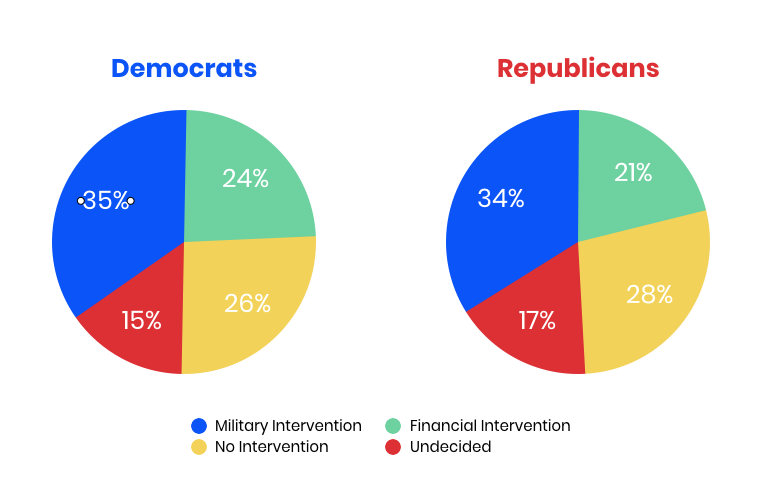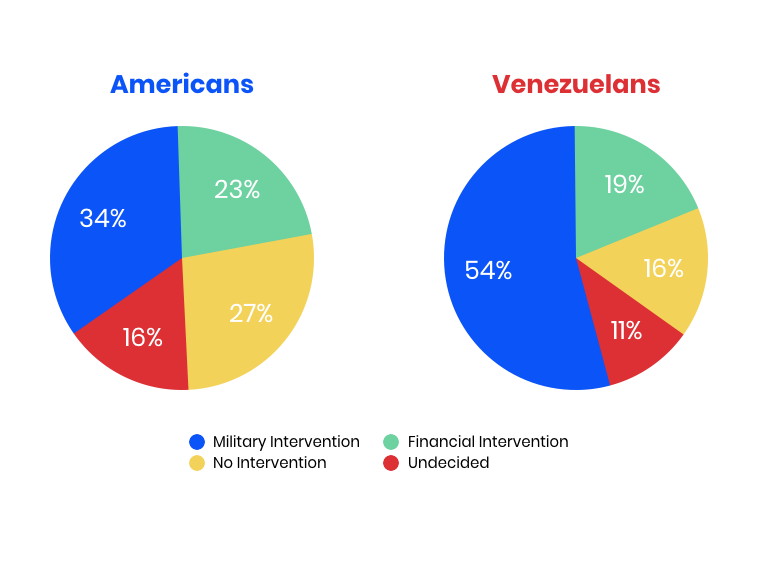Venezuelans lose hope of non-violent resolution
The growing economic and political crisis in Venezuela has received worldwide media coverage over the past few weeks. The Latin American country has been facing a very difficult economic crisis since 2010, which has led to hyperinflation, food shortages, poverty, increasing crime rates and mass emigration. The popular belief among Venezuelans is that the socialist government has been responsible for these outcomes.
In recent weeks, the Venezuelan crisis has created more urgency in the debate about possible solutions and the extent to which foreign powers should be involved. We conducted a survey targeting US and Venezuelan audiences to better understand their views on a potential foreign intervention by the US in an effort to solve the crisis.
Democratic vs Republican findings (US)
Americans can’t agree on virtually anything in 2019, from healthcare reforms to gun-control policies. However, voters from both political parties share relatively similar views on the potential ways in which the U.S. should become involved in the Venezuelan crisis, indicating that there is some sort of agreement between them in matters of foreign policy.
Opinions regarding the effectiveness of a US military intervention in Venezuela were similar across US political lines, with 82% of Democrats and 80% of Republicans in agreement that this option would substantially or greatly influence events in the country, for better or for worse. The best course of action was somewhat divided, although the breakdown was distributed nearly evenly, within both parties. 35% of Democrats and 34% of Republicans were in favor of a military intervention, nearly a quarter of both parties supported the offering of financial assistance (24% Democrats/ 21% Republicans) and approximately the same number were against the idea of an intervention of any kind. In addition, 85% of Democrats and 87% of Republicans recognised that any type of involvement from the side of the U.S. would either greatly or substantially change the course of events in Venezuela.

How does this compare to the Venezuelans?
As the crisis becomes more dire, Venezuelans are overwhelmingly in support of a US intervention as a necessary means to solve the crisis. When questioned about the importance of U.S. involvement, 85% of Venezuelans deemed it as either essential or important, a belief shared with 87% of Americans surveyed.
However, those who are on the front lines of the crisis expressed a less hopeful view on the possibility of a non-violent resolution, with nearly half of Venezuelans surveyed stating that there was no chance of reaching a solution without further use of violence. This belief was supported by a majority favorability for US military involvement. 54% of Venezuelans deemed a military intervention the only efficient way through which the U.S. can help in solving the crisis. In contrast, 19% claimed that the U.S. should only offer financial support. 16% believe that no intervention is needed and 11% declared undecided.
71% of Venezuelans expressed no affiliation to any political party, and instead placed their support behind specific political figures. With 82.66% of Venezuelan survey respondents voicing a negative opinion towards the current President of the country, Nicolas Maduro, and a strong desire for US military involvement, it would seem that the people of Venezuela have lost faith in their government to solve the crisis and are welcoming external foreign aid.

As the Venezuelan crisis intensifies, so does the growing desire to come to a resolution. The majority of Americans, both Republican and Democrat, agree that US involvement is very important, but are unsure of the best course of action with only ⅓ in support of US military intervention at this time. Those experiencing the crisis firsthand, however, express increasing desperation for US intervention by any means possible.
The Venezuela crisis survey was conducted in the United States and Venezuela, targeting respondents who expressed strong familiarity with the Venezuelan crisis. The survey audience was comprised of 300 respondents in each country, across men and women of all legal voting ages 18- 55+.
Do you want to distribute your survey? Pollfish offers you access to millions of targeted consumers to get survey responses from $1 per complete. Launch your survey today.
Global GSK Shingles Survey Insights
Original Insights,The Pollfish Blog
February 24, 2024
Shingles misconceptions: new global survey commissioned and funded by GSK highlights widespread…
B2B Sales Emails: Are they Effective or a Nuisance?
Original Insights,The Pollfish Blog
September 6, 2022
Are B2B sales emails a thorn in your side? Do they drive you crazy? Virtually all white-collar…
